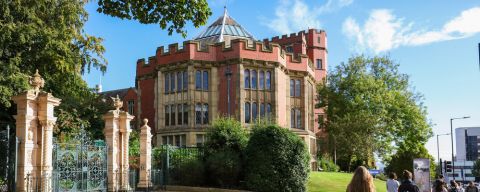Exactly a year ago, our new minister, Jo Johnson, gave his first major speech since being handed responsibility for universities, science and innovation.
In it, he gave his commitment to "One Nation Science" – but not in a conventional lab, or in the great hall of an established university. Instead, Johnson came north, to Rotherham.
What he found there may surprise you. The University of Sheffield’s Advanced Manufacturing Research Centre is a high-tech collaboration between research and industry, focused on aerospace, automotive engineering, medical tech and nuclear energy.
His team, which came ahead of the visit, weren’t sure at first. This didn’t look like a typical university. But Johnson knew that science and industry needed to be joined at the hip.
Did he know then that making a link between science, industry and skills would be his key role in a new administration? I think not, but he is clearly up for it.
What Johson saw was a technology centre of the future. A senior colleague from Rolls-Royce explained how university scientists and engineers worked side by side with industry in a high-tech skunkworks designed to solve live problems and create value. This was the place where we drove up the productivity for aerospace manufacturing in the UK.
But what of the other side of Johnson’s new brief – teaching?
Describing the newly expanded Department for Education, a government statement this week spoke of the benefits of bringing together schools, further education and universities to improve access for children from disadvantaged backgrounds. A new prime minister stood on the steps of No 10 Downing Street and talked about the educational prospects for poor white boys.
Overseeing this work will be a new secretary of state for education, Justine Greening – who herself went to a comprehensive school in Rotherham.
We know something about the prospect of poor white boys in South Yorkshire, and we have done something about it. When Johnson had finished looking at the technology being developed between university and industry he saw the missing part of the puzzle.
Alongside research and companies is our University Apprentice Training Centre. Here, 600 bright young people from the other side of Sheffield – most of whom would never consider university any other way – are employed by companies and are gaining an education in one of the best industrial research contexts in the world.
Why did we do that? How is that the business of a university?
When I started at Sheffield, I looked back at my own career and thought: how did I get from being a comprehensive school boy in the Rhondda Valley to Oxford and America? Who helped me understand what was possible?
I remembered that it was because my father, after leaving school at 14, had "got on" through a mix of national service and correspondence courses. His new life as a cost and works accountant meant he could ask middle-class colleagues how it was done. Just like a black cab driver, I now had access to vital advice – the "knowledge" of the university world.
Then I looked at our ability as a university to attract boys like me, but who did not have the luxury of asking a friend. Our institution was doing well compared with many, but the prospect of debt and the need for a job in communities that may have generations of low employment made university another world. It seemed damned difficult to get into communities with no previous links to university education, however hard we tried – and try we did.
I saw that the landscape of education from housing estates to university to job was simply too rugged and complex. Not just long and winding either, there also were lots of broken sections for those without the knowledge.
So I asked an expert on local structures to think of a "Sheffield system" – a sort of satnav to get you from home to school and to whatever was needed to get a job. I have worked many years in the US and knew that some rates have a system of this sort.
I thought it was a great idea. I was also hearing from the local city region how crucial advanced skills would be to expanding our economy and attracting new investors.
Yet as I talked to local schools I realised that, while there was a great deal of goodwill for this to come about, without a policy framework of some kind to guide, it was not going to work. I also found real surprise and suspicion. Why was a research university so interested in such matters?
The reason was simple – money. Funds were tight and sharing the education of students may mean sacrificing resource. It felt to some as though we might starve them of cash.
I was on the verge of giving up when I talked to the UK's advanced manufacturing guru, Keith Ridgway. Like me, he came from a working-class background in an industrial area and still had family for whom universities were a world apart. He explained to me that an important opportunity had come up. Rolls-Royce was building a new turbine blade factory alongside our AMRC in Rotherham, and local companies were concerned they would mop up the skilled people.
Keith said that the university could build a new apprentice centre to train a new generation of "Top Gun apprentices". This new generation, trained in the most advanced environment of its type, designed with the future of advanced manufacturing in mind, would have jobs with local and global companies.
They would not be students, taking on debt. They would be employed – but with the scope to go further. It would be true access.
Why would a university do this? Because we can.
And in the new era of education and industrial strategy, of a country divided in its opportunity, we simply must. We can link the future careers of young people with the real demands of present day companies to be part of the future of industry. We who have the advantage of drawing on world-class scholarship, and can link apprentices to a "Russell Group of companies" and their supply chains. I thought it was our duty to get in there. So we did.
I love to invite people to visit Rotherham and see this transformation for themselves. Again and again, people are surprised at the quality and potential of what lies before them. This is not a second-rate future. It is aspirational and flash. Apprentices with talent can go on to degrees and beyond. It is truly allied to world-leading research and it attracts the best.
We do need a joined-up education pathway that links education to jobs, jobs that come about because of a joined-up industrial strategy that is nothing without world-leading research. Johnson has a big task ahead to link the work of two departments and of different communities.
It is vital for young people and for the future of the UK that he succeeds.
Sir Keith Burnett is vice-chancellor of the University of Sheffield.
Write for us
If you are interested in blogging for us, please email chris.parr@tesglobal.com
POSTSCRIPT:
Print headline: HE lessons from South Yorkshire
Register to continue
Why register?
- Registration is free and only takes a moment
- Once registered, you can read 3 articles a month
- Sign up for our newsletter
Subscribe
Or subscribe for unlimited access to:
- Unlimited access to news, views, insights & reviews
- Digital editions
- Digital access to THE’s university and college rankings analysis
Already registered or a current subscriber?










